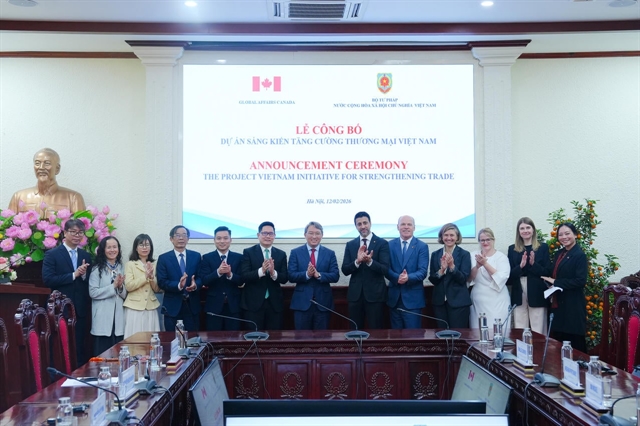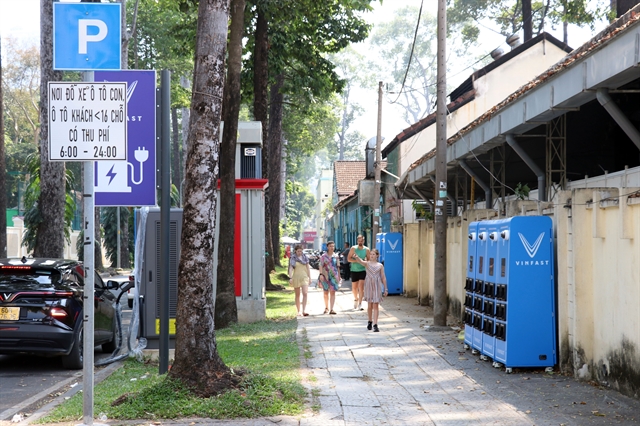 Economy
Economy

 |
| GSO director general Nguyễn Thị Hương |
Along with global trends, Việt Nam's inflation in the first three months of 2023 was decreasing. Therefore, the General Statistics Office (GSO) has forecast that this year's inflation would be controlled under the target set by the National Assembly. However, there are still many challenges to meeting the National Assembly's inflation target of about 4.5 per cent.
GSO director general Nguyễn Thị Hương spoke to Vietnam News Agency about this issue.
In the first quarter of 2023, the average core inflation increased by 5.01 per cent compared to the same period in 2022, higher than the average CPI growth. What is the cause of that?
The average core inflation of Việt Nam in the first quarter of 2023 increased by 5.01 per cent, the highest rate in the past 10 years.
In this quarter, the COVID-19 pandemic was still complicated, so consumption of goods in the first months of this year increased compared to the same period last year, leading to higher prices.
Along with that, some support policies of the State have expired since the beginning of 2023, causing commodity prices to increase again.
The high production costs of enterprises due to the high prices of domestic and imported raw materials were also reflected in the prices of consumer goods and services.
At present, Việt Nam's core inflation excludes the prices of 16 commodity groups of food, foodstuffs and energy, and service prices that are managed by the State such as health and education.
Therefore, the core inflation was still higher than CPI although the average domestic petrol price in the first quarter of 2023 decreased by 11.09 per cent compared to the same period last year which was a factor restraining the growth of CPI.
However, Việt Nam's core inflation is following a decreasing trend. The growth of core inflation reduced from 5.21 per cent in January 2023 to 4.96 per cent in February and 4.88 per cent in March.
What solutions does GSO propose to control the growth of core inflation?
GSO recommends that the Government, ministries, sectors and localities should closely monitor price and inflation movements in the world to promptly warn about risks affecting Việt Nam's prices and inflation. Based on those, they should also take appropriate response measures to ensure supply and stabilise domestic prices.
The State Bank of Việt Nam needs to maintain a proactive, flexible and cautious monetary policy, closely coordinating with other fiscal and economic policies to stabilise the macroeconomy.
It is necessary to have flexible adjustments on exchange rates to minimise imported inflation and to keep stability in foreign exchange and money markets.
It should also ensure the supply of credit capital for the economy but not have a subjective manner to inflation risks.
Ministries, sectors and localities need to prepare an adequate supply of goods to meet people's needs for essential consumer goods and services.
At the same time, they proactively take measures to control and stabilise commodity prices, and strictly handle acts of hoarding to hike prices.
Manufacturers should forecast raw material shortages to have imports in a timely manner or actively seek alternative sources to avoid supply disruptions. They should also promote the use of domestic raw materials instead of imports to increase economic autonomy.
Along with that, it is necessary to strengthen communication to provide information about the Government's price management, contributing to stabilising consumer psychology and keeping stability in inflation expectations.
The inflation trend in Việt Nam has shown signs of decreasing since the beginning of the year. Will this trend be maintained to ensure the National Assembly's inflation target of about 4.5 per cent for this year?
Along with the world trend, Việt Nam's inflation in the first three months of this year was also on a downward trend.
The consumer price index (CPI) increased by 4.89 per cent on year in January, 4.31 per cent in February and 3.35 per cent in March.
In the first quarter of 2023, Việt Nam's average CPI increased by 4.18 per cent over the same period last year, not in the group of countries with high inflation.
CPI fluctuations in the past 10 years show that every three years, the CPI growth was high in the first months of the year, then had a decreasing trend until the end of the year. The average CPI for the whole of 2014, 2017 and 2020 were all lower than the average CPI of the first three months of the year.
Specifically, CPI increased by 4.83 per cent compared to the same period last year in the first quarter of 2014, while surging 4.09 per cent for the whole year.
A similar situation happened in 2017 and 2020 with CPI growth at 4.96 per cent in the first quarter of 2017 and 3.53 per cent for 2017, and 5.56 per cent in the first quarter of 2020 and 3.23 per cent for 2020.
Therefore, according to this rule, it is likely that 2023 will also continue the decreasing trend in the following months if there are no abnormal factors.
Is controlling inflation under the target set by the National Assembly a challenge?
Achieving the inflation target for 2023 set by the National Assembly will face many challenges due to the impact of a number of factors.
Prices of raw materials in the world market are still high. Prices of energy and strategic materials are forecast to continue to fluctuate due to the impact of the conflict between Russia and Ukraine.
The recovery of China's economy is likely to affect prices in the world market.
Meanwhile, Việt Nam is a country that imports a lot of raw materials for production, so the high prices of raw materials will put pressure on the prices of domestically produced and consumed goods.
An increase in wages will lead to growth in the prices of goods. Adjusting prices for state-managed services according to the roadmap, such as medical and educational services, will also affect CPI in 2023.
Besides, the pressure of the demand-pull inflation from the support packages and disbursement of public investment for promoting economic growth will push up the prices of goods and services. It also puts pressure on general inflation.
The current low price of live pork may affect the supply from re-herds, pushing pork prices up in the last months of the year because of higher consumer demand during Tết. That will affect the food prices and impact CPI.
In addition, natural disasters and diseases can affect food and foodstuff prices in some localities, which will also increase CPI.
Travel services are also likely to increase sharply in 2023, putting pressure on inflation.
Meanwhile, there are still many factors that will help reduce pressure on prices this year.
Việt Nam has an abundant supply of food and foodstuffs, meeting the needs of domestic consumption and export. That is Việt Nam's advantage, helping to reduce inflationary pressure.
The Government's programmes on macroeconomic stabilisation and inflation control in recent years will help strengthen the confidence of businesses and people in a stable macroeconomic environment, thereby stabilising the economy and inflation expectations.
With the Government's experience in successful price management in recent years and the efforts of businesses and people, GSO believes that this year's inflation will be controlled to reach the target set by the National Assembly. VNS




